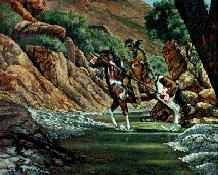
Lipan Apache

Courtesy Diane Stanley, Vision Quest Studios
According to a map I have that shows the locations of the Indian Tribes in
Oklahoma and Indian Territories, in the northeast corner of the Kiowa, Comanche,
Apache Reservation, there was a small band of Lipan Apache. I have found very
little on these people and in the book I read, the information was given by one
who said he was the last of the Lipan. Since they were living in this area, I
felt they should be mentioned as a part of this Reservation.
The Lipans
were the branch of Apaches that roamed for the greater part of the time east of
the Rio Pecos, and claimed as their own, all that land to the Gulf of Mexico.
Their rights were disputed by other tribes, especially the Kiowa, Comanche and
Wichita, as well as the Texans and Mexicans that lived in Texas.
As a
boy, their chief , Magoosh, had witnessed the fall of the Alamo in 1836. The
Lipans were sympathetic to the "white eyes" in that battle, and would have
helped the beseiged men if they had been able. The term "white eyes" came about
from the first meetings with Europeans. The Indians had not seen anyone with the
whites of the eyes, so white. It was unsettling to them. With the Indian, the
white parts of their eyes are more of a coffee color. Magoosh is the only early
Apache, that was bald. It was thought that he may have been scalped at some
time, as there are times when people that had been scalped had
lived.
Some years after the Alamo fell, Magoosh had become chief. The
Lipans suffered an epidemic of small pox. The deaths were many, and the numbers
in the tribe fell. It was a virulent type, and few who got it survived. It is
thought they got it from the Mexicans. When they raided Mexican villages, the
only things they took were weapons and ammunition, and their shirts. Possibly
they caught the virus from the shirts. The Medicine Man could do little or
nothing for the victims.
Soon, they realized if the band stayed together,
more would die. Chief Magoosh held a council and it was decided that they would
break into smaller bands, with a leader or headman, and it would be composed of
relatives. Arrangements were made that when the sickness ceased, they would
reassemble when and where the chief selected. This must have been when the small
band came into what later became Oklahoma.
One group led by Venagos went
south, crossing the Rio Grande and settled in the mountains near Zaragosa. They
lived peacably among the Mexicans in the area. During their years spent in
Mexico, the Lipans aquired some of the habits and beliefs of their neighbors,
especially in witchcraft. All Apaches believed in it, but perhaps not to the
extent the Mexicans among whom the Lipans lived.
Magoosh had taken the
few remaining members of his band to join the Mescalaro. There was a vague rumor
they were living somewhere in southern New Mexico on a reservation, but no one
knew where. The time came, when Venagos decided it was time to join their
brothers. Antone Apache felt that he, the only unmarried man should be the one
to locate the chief and his people, and if possible, bring the others from
Mexico.
In order not to make a second trip, it was decided that after 2
moons, the group remaining would start northwest and come a long way. When they
reached the Pecos, they would know it by the taste and effect of the water. Once
across the Pecos, they were to look to the mountains, since the Apache had
always lived in the mountains.
Antone Apache, who had never seen a map,
and who had not left Mexico since the band had gotten there, traveling at night,
unaided, found the Pecos, then the reservation. He lay in hiding, waiting for
someone he recognized. The first positive indentification he made was Chief
Magoosh, after all, how many bald Apaches could their be? He watched until he
could catch the chief alone to approach, and explained why he was
there.
It took a while, but finally the Veragos' small band in Mexico,
came home to join their people.

This information was in an interview with Eve Bell, "An Apache Oddyse,
INDEH" with Philemom Venego, May Second, daughter of Chief Peso, and Rose Tee
(Tahnito) Philemon referred to himself as the "last Lipan".
Please visit The Lipan
Apache Band of Texas
For more information about the Lipan Apache, please visit this
site.

April 3, 2011
Copyright 1997-2011
This information compiled, prepared and submitted to this site by Ethel Taylorand remains the property of the
submitter
NOTICE: Ethel Taylor grants that this
information and data may be used by non-commercial entities, as long as this
message remains on all copied material, for personal and genealogical research.
These electronic pages cannot be reproduced in any format for profit, can not be
copied over to other sites, linked to, or other presentation without written
permission of Ethel Taylor.




